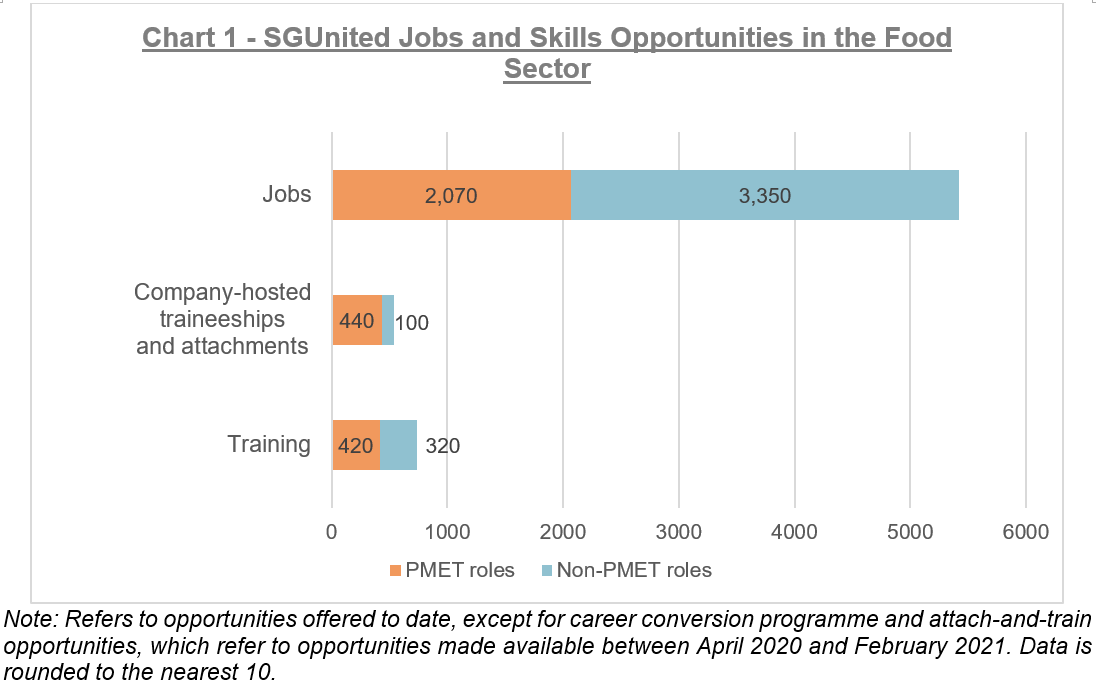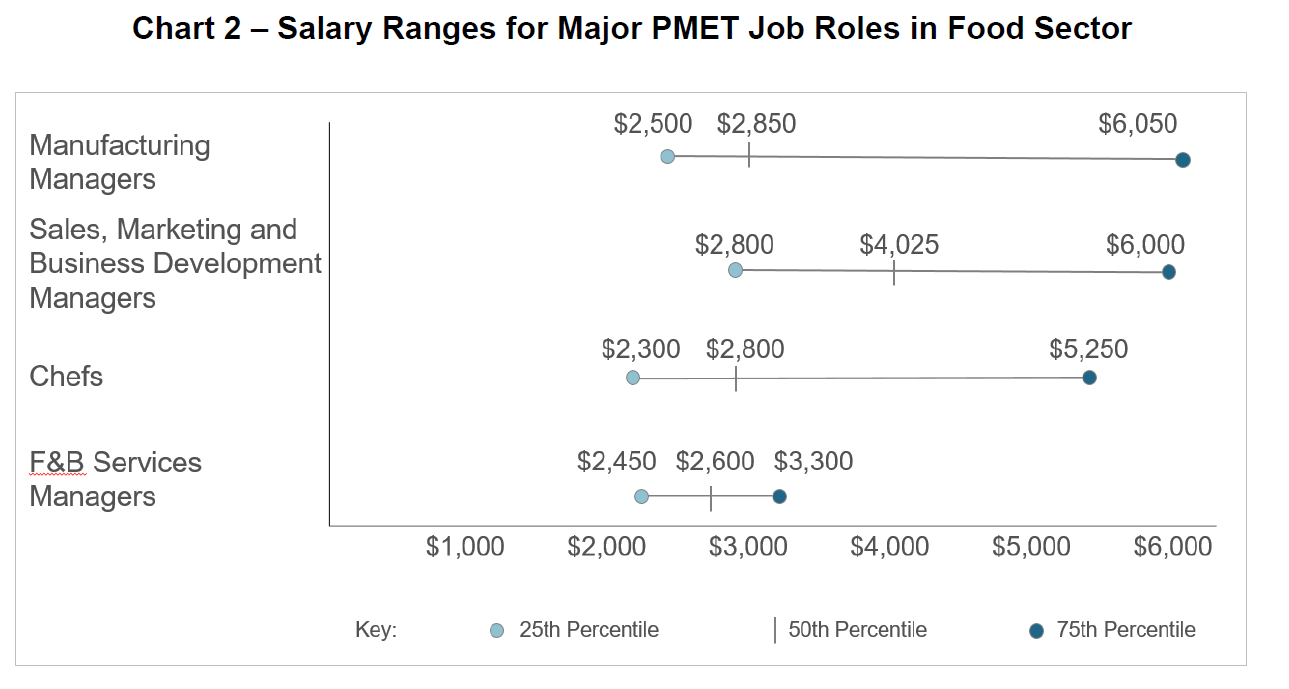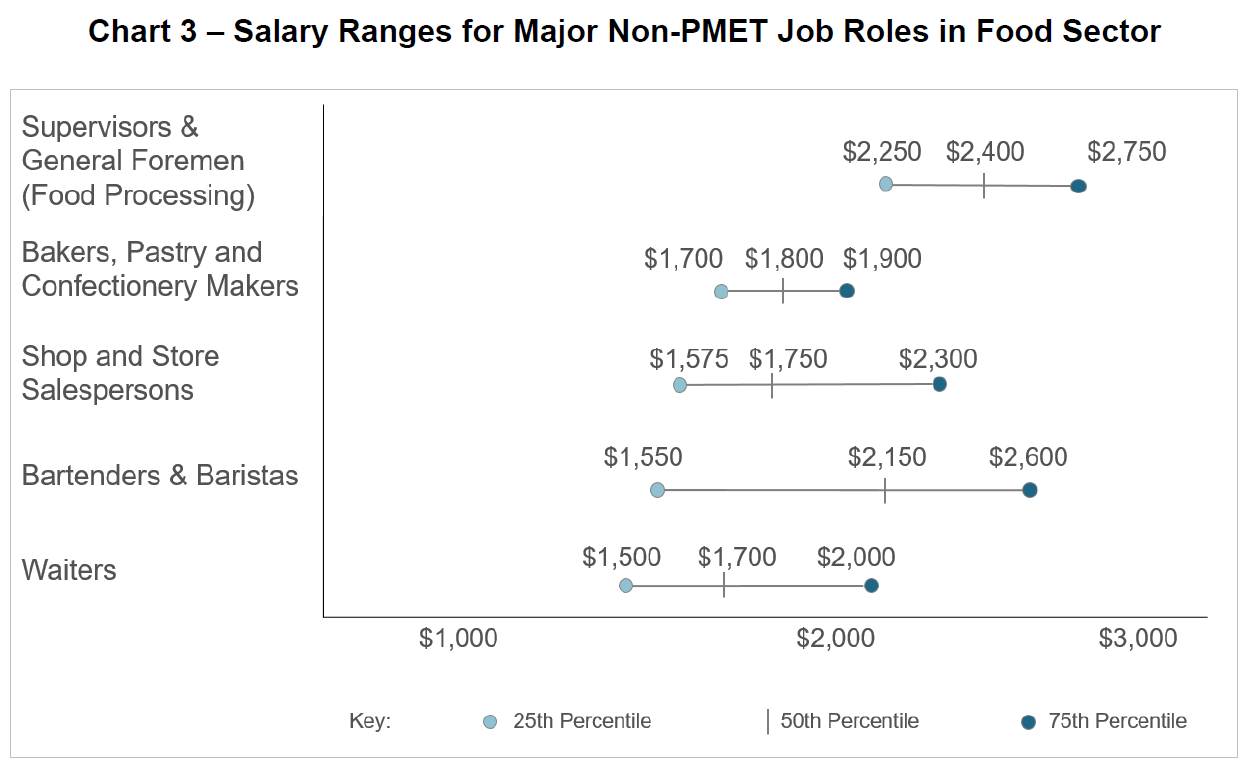Jobs Situation Report - 6th Edition (21 Sep)
6,700 opportunities in food sector. More than 44,000 jobseekers helped through career matching services between January and August 2020.
- This week’s Jobs Situation Report focuses on the Food sector, which comprises both food services and food manufacturing sub-sectors. It will highlight where the opportunities are and how jobseekers can access them.
Overview of the Food Manufacturing and Food Services Sub-Sectors
- The food manufacturing sub-sector is a growth sector comprising over 940 enterprises, contributing 1.1% to our GDP and employing more than 48,000 workers.
- Food manufacturers have been capitalising on Singapore’s strong branding for food safety, quality and hygiene, and its strategic location, to export locally manufactured food products to overseas markets such as the ASEAN countries, Japan, Australia and China.
- The Government has been working with businesses and workers in the sub-sector to promote food innovation, research and development (R&D), internationalisation and automation.
- The food services sub-sector comprises over 10,000 enterprises, contributing 0.8% of Singapore’s GDP and employing over 180,000 workers.
- Within this diverse sector, more innovative companies are differentiating themselves with fresh dining concepts, products and services, to cater to increased and new consumer demands.
- The Government has been making a strong push for automation and artificial intelligence to improve productivity and jobs.
Impact of the COVID-19 Pandemic on Food Manufacturing and Food Services Sub-Sectors
- The impact of COVID-19 pandemic has been uneven on the food manufacturing sub-sector:
- Food manufacturers that had invested in automation before COVID-19, such as KH Roberts Group, continued to grow as they were able to continue producing food supplies and meeting business demands with minimal disruption despite Circuit Breaker measures.
- Such investments have been key in helping to safeguard Singapore’s food security and supply chain sustainability especially during crises;
- Nonetheless, business outlook remained mixed for food manufacturing companies serving different markets:
- Companies manufacturing staple food and those that sold their products through retail channels saw a 30% to 70% surge in sales;
- Conversely, companies supplying hotels, restaurants, cafes (HORECA) and food services space saw a 40% to 90% decline in sales.
- Hiring activities in the food manufacturing sector mirrored these business trends:
- Hiring activities remain muted for companies serving HORECA and food services space since the Circuit Breaker.
- However, hiring demand remains resilient for certain food manufacturers. For example:
- Companies producing staple food and/or sold through retail channels are likely to hire to meet ongoing or increased demand, as well as festive demand, for essential food items.
- Shortage of workers affected by travel restrictions and border lockdowns may also encourage their employers to hire local talents.
- On the other hand, the food services sub-sector was harder-hit by the COVID-19 pandemic and had to cope with manpower shortage and low footfall due to the Circuit Breaker measures.
- Prior to Phase 2 re-opening, many existing workers were redeployed to other job functions as food services companies pivoted to other revenue opportunities, such as food deliveries.
- When Phase 2 started and dining-in resumed, hiring activity in Food Services picked up slightly.
- The Restaurant Association of Singapore (RAS) and the Association for Catering Professionals (ACAPS) will be partnering Workforce Singapore (WSG) to reach out to more jobseekers who had been affected by COVID-19, through virtual career fairs to embark on new, exciting careers in the food services sub-sector.
- To seize business opportunities in the new normal, food services companies also embarked on transformation efforts by:
- Implementing new digital technologies, including e-procurement, e-ordering and e-payment;
- Venturing into ready-to-eat and ready-to-cook food; and
- Reskilling existing workers to use new technologies to augment their work more effectively, and to retain them for the long-term.
- Such efforts will put these companies in good stead to build resilience and be ready when demand for their services rebound.
- To support food services companies’ business transformation and reskilling of existing workers whose jobs are at risk, WSG also introduced the Job Redesign Reskilling Programme for the Food Services Industry in February 2020.
- Minimised potential retrenchment and ensure that the food services sub-sector would continue to have the skilled manpower they need to meet business demand post-Circuit Breaker.
- With the improvement in processes aided by technology, companies also redesigned and enhanced jobs by
- Collapsing various existing roles to create new ones (e.g. combining the role of server, cashier and hostess to a Service Ambassador role) whose tasks are augmented by technology.
- Cross-training workers to perform both front-of-house and back-of-house duties.
- As of end August 2020, close to 900 existing workers across 25 food services companies have been, or are being, trained and redeployed into new or higher-value roles.
- 74% of them are aged 40 and above.
- Workers will benefit from the new skillsets acquired as they take on higher value jobs with manual and repetitive tasks replaced by technology, enhancing job satisfaction.
- There is also scope for reskilled workers to earn higher wages when the economy improves.
- An example of a worker who has benefitted from the reskilling programme is 51-year-old Madam Ho Peck Li.
- She joined Sheng Kee Dessert PL under the Select Group in 2019 as a Service Crew Supervisor, attending to customers through front counter service.
- To improve productivity and efficiency, Select Group implemented a self-ordering system. The company tapped on WSG’s programme to train its staff, including Madam Ho, to use the new technology.
- Madam Ho feels a greater sense of job satisfaction as she takes on enhanced roles which include guiding customers to order through kiosks and interacting with them to enhance their dining experiences.
- She also collects ground feedback to provide to the management, so that the company can take timely action to better meet customer demands.
SGUnited Jobs and Skills Opportunities in the Food Sector
- Despite being impacted by the COVID-19 pandemic, since April, more than 800 companies in the Food Sector have offered close to 6,700 opportunities, of which 44% are for PMETs (see Chart 1 below). These include roles such as Food Technologists, Chefs, F&B Services Managers and Business Development Managers. Roles for non-PMETs include Supervisors and General Foremen (Food Processing), Bakers, Pastry and Confectionery Makers, and Shop and Store Salespersons.
- Majority of them are jobs.
- Companies that continue to hire include Tee Yih Jia, Gardenia Foods, Far Ocean, KH Roberts Group, RE&S Enterprises, Creative Eateries, 1855 F&B and HanBaoBao.

- Salaries offered for the PMET and non-PMET roles vary according to the specific job nature and skills requirements (see Charts 2 and 3 below).


- Between April to July 2020, more than 1,800 individuals have found jobs or took on new roles in food sector through WSG’s programmes, of which 56% were aged 40 and above.
- Close to 80 are mid-career individuals who entered the food sector through career conversion programmes. Most of them tended to come from:
- For the food manufacturing sub-sector: Financial & Insurance, other sub-sectors of Food Manufacturing and Wholesale Trade
- For the food services sub-sector: Accommodation & Food Services, Transportation & Storage and Administrative & Support Service Activities
- For instance:
- 49-year-old David Yeo was a former Sales Executive at an interior design company, specialising in developing marketing strategies.
- He left the company without a job before COVID-19 hit, wanting to venture in new areas.
- In April 2020, David signed up for the 9-month Attach-and-Train (AnT) for Food Production Specialist Programme with Singapore Poly, which equipped him with skillsets in food manufacturing such as food handling, food science/technology and implementation of lean food manufacturing.
- As a trainee at local food manufacturer Gelato Specialists Pte Ltd, David works closely with the R&D Chef to develop new food products for mass production as well as design process to produce recipes on a large scale using different machineries.
- He enjoys learning on the job and is appreciative of the chance to try a new job scope even though he did not have any relevant experience in the sector.
- Table 1 below highlights some of the transferrable skills from other sectors and skills that enhance career prospects for mid-career individuals in the food sector.
Table 1 - Transferrable skills and skills that enhance career prospects in food sector
| Transferrable skills |
Skills to be acquired |
|
Food manufacturing
- Innovation management
- Good manufacturing practice implementation
- ISO systems
- Process validation
- Strategy development
- Operation management
- Workplace safety and health (WSH)
|
Food manufacturing
- Automation process control and management
- Food science and technology skills
- Food safety management and control
- Food regulatory compliance
- Food production management
- Quality management
|
|
Food services
- Customer service
- Food product marketing
- Operation and inventory management
- Innovation management
- Digital skills
|
Food services
- Food service application
- WSH for F&B operations
- Food safety analysis
- Quality management
- F&B production management
- Basic food preparation and culinary knowledge
|
- Jobseekers with little or no prior experience can consider taking up the following to gain exposure to the work in the food sector:
- Company-hosted traineeships and attachments which offer roles such as Flavour Technologist, Marketing and Communications Trainee, and Business Development Trainee; and
- Training courses under the SGUnited Skills programme to undergo training to take on:
- For the food manufacturing sub-sector:
- Traditional job roles such as Business Executives, Food Technologists and Food Processing Workers; and
- New job roles to support the emerging Agritech sector such as Farm Technicians
- For the food services sub-sector:
- Traditional job roles such as Pastry/Chef de Partie and Food Laboratory Assistant
- New job roles to support enterprise transformation efforts such as Digital HR Business Partner, Data Analyst, and Marketing / Brand Executive / Manager
- The experience and skillsets gained will allow individuals to boost their employability for roles across the food sector
- Since April 2020, close to 80 jobseekers have also entered company-hosted traineeships and enrolled for training under SGUnited Skills programme.
Engagement and Outreach Efforts to Help Singaporeans Access Opportunities
- To help jobseekers better navigate and access the opportunities, WSG and NTUC’s Employment and Employability Institute (e2i) provided 44,200 jobseekers with basic career advisory or job search assistance through career matching services between January to August 2020.
- This is 40% more than the same period in 2019, due to increased (i) outreach by WSG and NTUC’s e2i through an expansion of touchpoints and (ii) demand from jobseekers making career transitions.
- Of the 44,200 jobseekers, 25,700 received individualised career coaching, which is 22% more than the same period in 2019.
- Jobseekers can visit www.mycareersfuture.gov.sg/careercoaching (scan QR code below to visit the website) or call WSG’s hotline at 6883 5885 for more information on its programmes, and career advisory and matching services.
- In addition, NTUC’s e2i organised 39 outreach and engagement activities across Singapore in August 2020, reaching more than 3,200 jobseekers where each jobseeker had at least 4 to 5 job opportunities. Please refer to Table 2 for more details of these events.
Table 2 - List of NTUC-e2i’s engagement and outreach efforts in August 2020
| Activity |
What is it? |
Occurrences |
Attendees |
| Walk-in interviews |
- More than 8,000 job opportunities were available.
- On-the-spot interviews with employers who are hiring for roles in areas such as healthcare, environmental services, childcare, hi-tech manufacturing, etc.
|
17 sessions |
More than 2,000 jobseekers attended these events |
| Career workshops and Seminars |
- Platforms to provide jobseekers with job search tips and career advice.
- Featured topics such as career planning, latest interview techniques and improving interview responses; acing online interviews; salary negotiation; and for non-PMET jobseekers: how to make use of different online portals to find jobs.
- Includes CoC Special Limit Programme workshop that highlights various job opportunities available in the maritime.
|
22 sessions |
More than 1,200 jobseekers participated |
- The list of upcoming engagement and outreach events organised by NTUC’s e2i and WSG for the rest of September 2020 is also available in the Annex D.
- Jobseekers may register for these events at either https://www.ssg-wsg.gov.sg/events.html or https://e2i.com.sg/events.